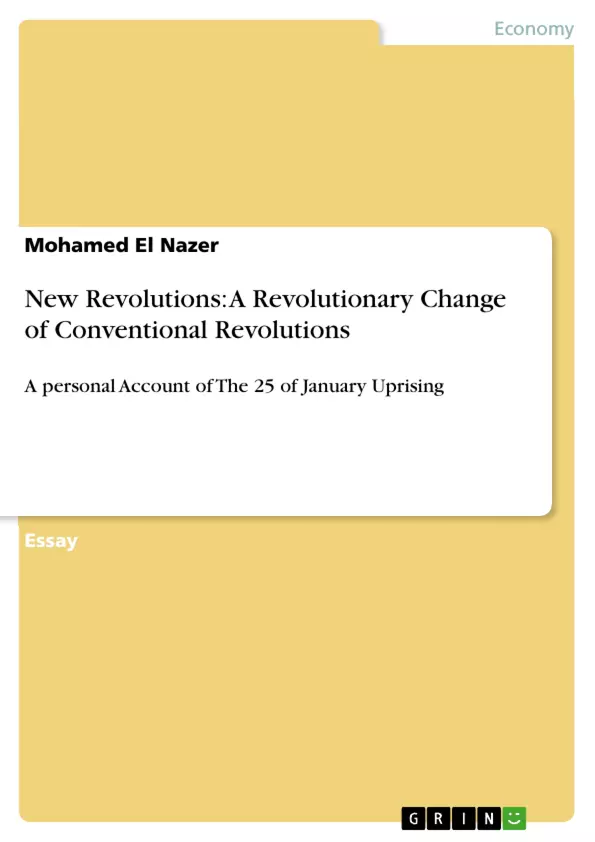Let’s get one thing straight, The Egyptian revolution was not a Facebook revolution. Was Facebook immensely important? Yes. Was it the catalyst? Maybe. But that is as far as those assumptions can go. Social media today has no longer become just another pastime. Websites like twitter and facebook have now become a way of living rather than a hobby or interest. Ask yourself this, why was the government’s first plan of defense to shut down the internet connection and phone lines? Why was a people’s revolution unprecedented in the past given the simple term of a “Facebook Revolution”? To answer these questions one must look at the power and momentum of social media in Egypt, the transformation of social media like facebook and twitter from places of expression to sites of political organizing. To understand this revolution one must engage the political situation that bloggers and mass public alike have been surviving for so long.
Inhaltsverzeichnis (Table of Contents)
- The Revolution of Conventional Revolutions: 25th of January Revolution, a Passive Revolution and a Frontal Attack Combined
- Social Media’s Role in Organizing the Revolution
- The Significance of Social Media
- A People’s Revolution
- The Future of Revolutions
Zielsetzung und Themenschwerpunkte (Objectives and Key Themes)
The paper explores the role of social media in the 25th of January Revolution in Egypt, examining its significance as a tool for organizing and mobilizing protesters. It challenges the notion of a "Facebook revolution" by highlighting the complex socio-political context that led to the uprising. The paper also discusses the future of revolutions in the Arab world, considering the impact of social media and the potential for sustained change.
- The role of social media in the Egyptian revolution
- The importance of social media for organizing and mobilization
- The socio-political context of the Egyptian revolution
- The future of revolutions in the Arab world
- The potential impact of social media on political dynamics
Zusammenfassung der Kapitel (Chapter Summaries)
The paper begins by emphasizing the significance of social media, specifically Facebook and Twitter, in facilitating political discourse and organizing in Egypt under the Mubarak regime. It highlights the government's attempts to suppress online activism and the subsequent emergence of these platforms as crucial tools for communication and dissent.
The paper then examines the events of the 25th of January revolution, emphasizing the role of social media in spreading information and mobilizing protesters. It also discusses the government's response, including the shutdown of internet access, and the impact of these actions on the revolution's trajectory.
The paper further explores the nature of the revolution, arguing that it represented a rupture with past revolutions in Egypt due to its widespread popular participation and its reliance on social media. It discusses the implications of this for the future of revolutions in the Arab world, particularly in light of the growing influence of social media.
Schlüsselwörter (Keywords)
The key themes of the paper include the role of social media in political change, the impact of online activism on government suppression, the nature of popular revolutions, and the future of social and political dynamics in the Arab world. Important concepts explored in the text include the 25th of January Revolution, the Egyptian government's internet shutdown, the use of social media for organizing and mobilization, and the potential for social media to transform political landscapes.
Frequently Asked Questions
Was the Egyptian revolution purely a "Facebook revolution"?
No. While Facebook and Twitter were crucial tools for organizing and mobilizing, the revolution was rooted in long-standing socio-political grievances.
Why did the Egyptian government shut down the internet?
The shutdown was a desperate attempt to stop political organizing and block the flow of information among protesters using social media.
How did social media transform from expression to political action?
Platforms like Facebook and Twitter evolved from personal spaces into sites for strategic political organizing and mass mobilization.
What is the significance of the 25th of January?
It marks the start of the revolution, characterized by a mix of passive resistance and a frontal attack on the existing regime.
What role did bloggers play before the revolution?
Bloggers spent years surviving and documenting the political situation, creating a foundation for the eventual mass uprising.
What is the future of revolutions in the Arab world?
The paper discusses how social media has permanently changed the dynamics of dissent and the potential for sustained political change in the region.
- Citation du texte
- Mohamed El Nazer (Auteur), 2011, New Revolutions: A Revolutionary Change of Conventional Revolutions, Munich, GRIN Verlag, https://www.grin.com/document/172846



